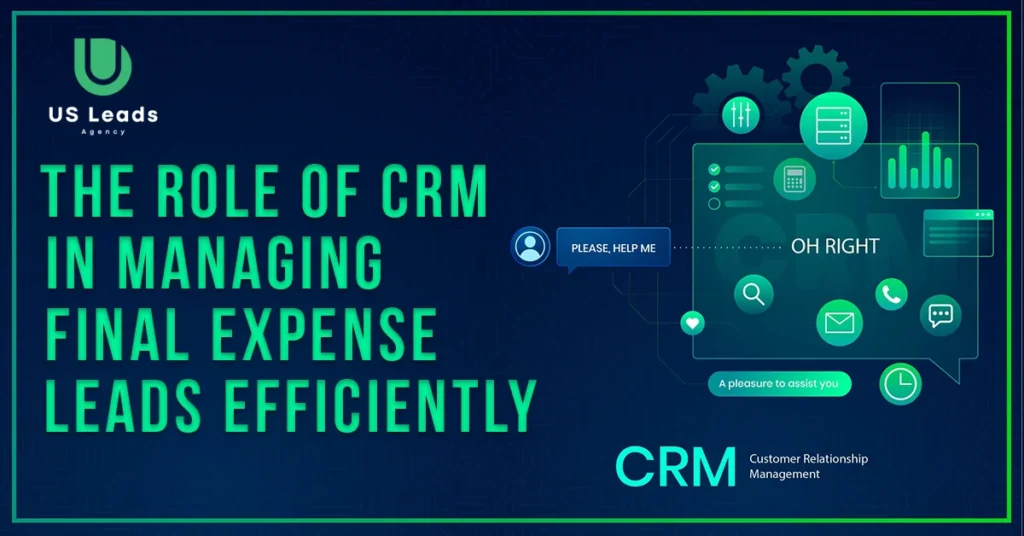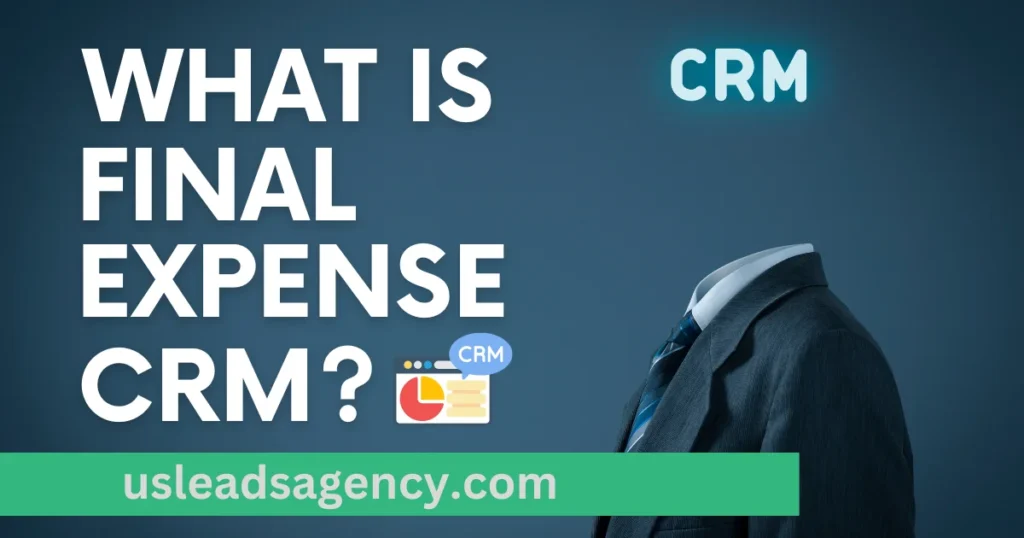
In 2024, the global Customer Relationship Management (CRM) market is projected to reach $88.19 billion, with an anticipated growth rate of 10.59% annually through 2028.
This surge underscores the increasing reliance on CRM systems across various industries, including insurance. For final expense insurance agents, leveraging specialized CRM tools is crucial for efficient lead management and enhanced customer relationships.
In this article, we will guide you what is final expense insurance CRM and the importance CRM in final expense lead management.
Key Takeaways:
- Specialized CRMs boost efficiency: Final Expense Insurance CRMs are tailored for niche needs, offering features like lead tracking, personalized communication, and policy management.
- Improves customer engagement: CRMs centralize client data, automate follow-ups, and enable personalized interactions, fostering trust and loyalty.
- Streamlines lead management: Automated tools within CRMs simplify lead capture, progress tracking, and assignment, ensuring no lead is missed.
- Enables data-driven decisions: CRMs provide analytics for lead behavior, sales forecasts, and agent performance, enhancing strategic planning.
- Enhances compliance and security: CRMs protect sensitive customer data and ensure adherence to industry regulations, maintaining trust.
- Supports marketing automation: Features like email campaigns and segmentation improve lead nurturing and increase conversion rates.
Table of Contents
What is a Final Expense Insurance CRM?

A Final Expense Insurance CRM is a tool for insurance agents selling final expense policies. It is not just another generic Customer Relationship Management (CRM) software, that fits all industries or specialties, but a software specifically designed to address the concerns that every final expense insurance agent encounters daily.
This CRM is specifically designed for final expense leads, contacts, and related tasks, offering features optimized for these processes. It’s like having an assistant dedicated to understanding all aspects of your company, from lead generation to policy details.
Key Features of a Final Expense Insurance CRM:
- Lead Capturing and Management: Efficiently capture leads from various sources and manage interactions to convert prospects into clients.
- Contact Management: Centralize client information, including personal details and policy specifics, for easy access and updates.
- Automated Follow-ups: Schedule reminders and automate communications to ensure timely follow-ups with leads and clients.
- Policy Management: Track policy applications, statuses, and renewals to maintain up-to-date records.
- Integration Capabilities: Seamlessly integrate with other systems such as policy management software and payment processing platforms.
Importance of Specialized CRM For Final Expense Insurance:
For insurance agents, a good Customer Relationship Management (CRM) strategy is familiar territory. However, generic CRMs often fall short in addressing the unique needs of final expense insurance.
Final expense insurance caters to a specific segment—primarily seniors arranging for their funeral expenses. This sensitive niche requires diplomacy and tailored solutions that generic CRMs lack.
Managing hundreds of leads in your pipeline with a generic CRM may leave gaps in follow-ups and support. In contrast, a specialized CRM like Agent CRM pre-sorts leads by needs and priorities, streamlining the process and enhancing efficiency.
Role of CRM In Final Expense Lead Management:
CRM software simplifies final expense lead management by offering tools to boost sales, improve customer interactions, and enhance overall performance. Here’s a detailed look at the role of CRM in managing final expense leads:
1. Lead Tracking and Management:
Every final expense leads and these leads’ progress can be contained in CRM systems and it is comprehensive in its storage. This database allows agents to:
- Capture Leads Efficiently: Every lead that is gathered from all the sources like websites, social media, or any marketing communication can be directly categorized in the system.
- Track Lead Progress: Every lead in the funnel should be checked on the status at this certain moment starting from the moment of its contact to the moment of sales closure concerning this lead.
- Assign Leads: It distributes leads to the respective sellers based on the business requirements such as geographic area, product area of interest, or working capacity.
2. Customer Interaction and Communication:
Thus, in the final expense insurance business, particularly, clear communication between buyers and sellers or insurance agencies is essential. CRM systems facilitate this by:
- Centralizing Communication: Append all the communications made in the past including e-mails, calls, and meetings in one place This ensures that the agent working on the case can look at the previous interaction to know what to do.
- Automating Follow-ups: In the case of the leads, it is suggested to systematize the follow-up and notification processes with the purpose of the systematic check of the leads ‘activity and reply and the improvement of the customer relations which will translate into the increase of the conversion probability.
- Personalizing Interactions: Use the information of CRM to provide messages that are of interest, need, and previous communication with the customer.
3. Marketing Automation:
CRMs often include marketing automation tools that can significantly enhance lead generation and nurturing processes by:
- Email Campaigns: Develop and create letters to introduce final expense insurance and all the aspects of it to the clientele base.
- Segmentation: Target thus from the segmentation level to come up with good and attractive marketing communiques.
- Tracking Campaign Effectiveness: Supervise the operation of the Marketing promotions, in a bid to differentiate that is efficient in the process of enhanced Marketing yields.
4. Data Analysis and Reporting:
Since lead management relies on the usage of data, decisions based on data offer a proper management method. CRM systems offer robust analytical tools that help:
- Analyze Lead Data: Thus, having analyzed such results as leads, received, the rate of their conversion, and other parameters, it will be possible to determine tendencies and possible problem areas.
- Forecast Sales: Projects the amount of sales for the future which is important in designing the plan of selling and controlling the resources.
- Measure Agent Performance: All agent performances should be recorded in the field for training on their strengths as well as areas where they are weak.
5. Compliance and Security:
Like other types of insurance companies, final expense insurance carriers handle the customers’ details which are often highly personal. CRM systems help maintain compliance and security by:
- Ensuring Data Protection: It must be reasonable and involve adequate measures that shall protect customers’ details against hacking and other related vice.
- Maintaining Compliance: Ensure that there is no change in the laws and ethos of the particular industry to make all the relations with the customers and the management of their data proper.
6. Integration with Other Systems:
CRM systems can connect with other business tools for smoother operations.
- Policy Management Systems: There is a need to interface it with the policy management software to decrease the lead generation to policy issuing timeframe.
- Payment Processing: Link to payment processing systems as a way of optimizing the efficiency of billing and collections from customers.
- Customer Service Platforms: Further link up with the customer service systems to provide the policyholders with comprehensive service and assistance.
7. Enhanced Customer Experience:
Ultimately, the role of a CRM in managing final expense leads efficiently boils down to enhancing the customer experience:
- Streamlined Processes: Reduce the time and effort required to manage leads, allowing agents to focus more on customer service.
- Consistent Interactions: Ensure that all customer interactions are consistent and professional, building trust and loyalty.
- Proactive Service: Use CRM data to anticipate customer needs and offer proactive service, improving satisfaction and retention.
Benefits and Challenges of Using CRM For Lead Management:
Implementing CRM systems for lead generation and management brings a host of advantages, but it’s not without its challenges. Let’s delve into the benefits and hurdles:
Benefits:
- Improved Lead Tracking and Management: Centralized lead information prevents missed opportunities and enhances follow-up efficiency.
- Enhanced Customer Engagement: Personalized communication fosters stronger client relationships and trust.
- Data-Driven Decision Making: Analytics provide insights into sales performance and market trends, guiding strategic decisions.
- Efficient Communication: Automated workflows streamline communication tasks, saving time and reducing errors.
- Increased Sales Productivity: Automation of routine tasks allows agents to focus on nurturing leads and closing deals.
Challenges of Using a CRM Lead Management System:
- Implementation and Onboarding Hurdles: Initial setup and training can be resource-intensive and may face resistance from staff.
- Data Security and Privacy Concerns: Ensuring compliance with data protection regulations is critical to maintain client trust.
- Integration Complexity: Aligning CRM with existing systems requires careful planning to avoid data conflicts.
- User Adoption Challenges: Encouraging consistent use among agents necessitates ongoing training and support.
- Costs and ROI Measurement: Evaluating the return on investment involves assessing both tangible and intangible benefits.
Conclusion – Final Expense Insurance CRM:
Implementing a specialized Final Expense Insurance CRM equips agents with tools to manage leads effectively, enhance customer interactions, and streamline operations. By addressing the unique challenges of the final expense insurance market, such CRMs contribute to higher conversion rates and improved business performance.
FREQUENTLY ASKED QUESTIONS:
Q: What is a CRM in life insurance?
A Customer Relationship Management (CRM) system in life insurance is a tool that helps agents manage client relationships, track policies, and streamline sales processes, enhancing efficiency and customer satisfaction.
Q: Can Insurance CRM help with lead generation and conversion?
Yes, Insurance CRM systems assist in capturing leads, automating follow-ups, and providing insights into lead behavior, thereby improving lead generation and increasing conversion rates.
